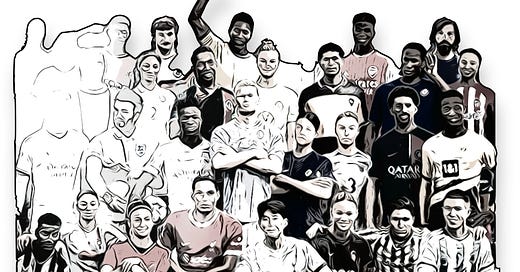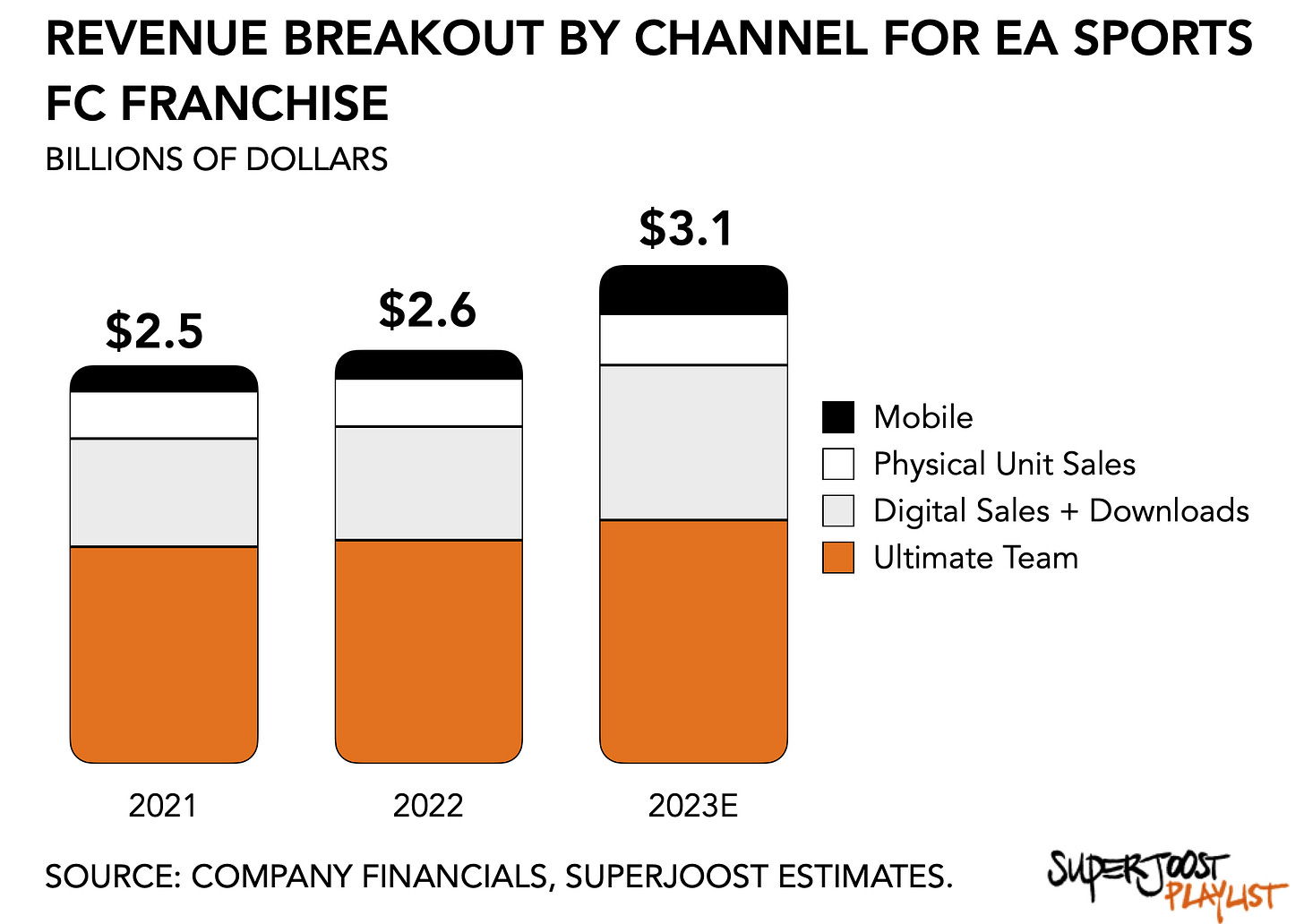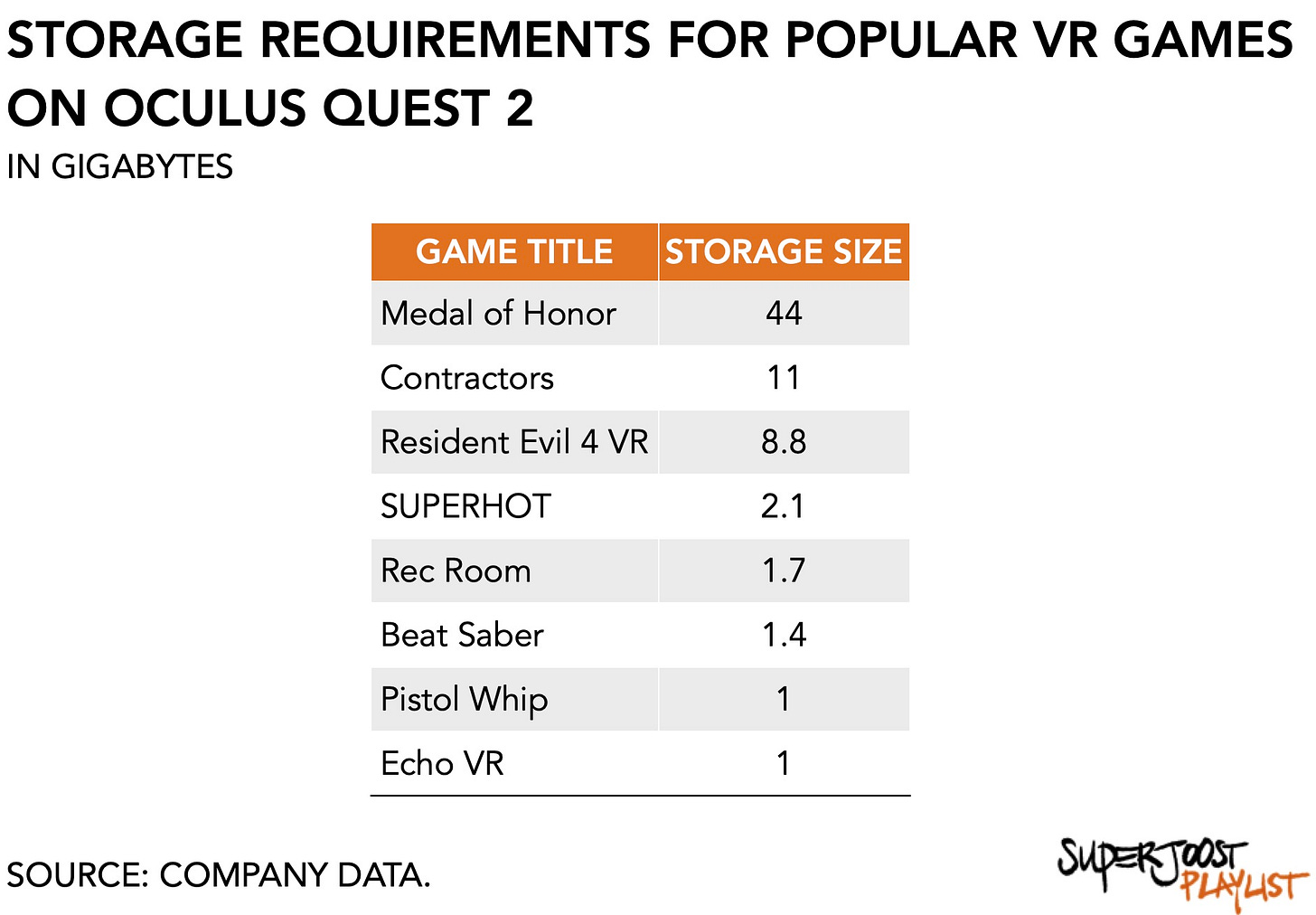The SuperJoost Playlist is a weekly take on gaming, tech, and entertainment by business professor and author, Joost van Dreunen.
Knowing when to quit is a superpower.
It’s intoxicating to think you will beat the odds and emerge a winner, even when everything around you says otherwise. Companies and their leaders are no different. Once committed, it can be incredibly difficult to redirect the momentum or have leaders let go.
This week came the announcement that after almost three decades, Jim Ryan, head of Sony Interactive Entertainment, is going to spend more time with his family. He steps down amidst changing times for the PlayStation maker. With the company holding a two-to-one market share lead over Xbox, Ryan has been demonstrably successful at maintaining PlayStation's dominance. However, Sony is transitioning into a media company, looking to leverage its library of intellectual property across a variety of different distribution channels. Ryan's resignation comes at an opportune time of change for Sony. Letting go is the right move.
Marc Zuckerberg, on the other hand, continues his push into virtual reality with stoic determination (see below). Succinctly, after missing the boat on mobile and finding himself entirely at Apple’s mercy, which promptly made it more difficult for then-Facebook to accurately target users with its ads, Zuckerberg is taking no prisoners.
Intent on establishing a dominant position in virtual reality, he’s going for broke. Between 2018 and 2022, the number of downloads of the Meta Quest mobile app has increased from 830,000 to 10.4 million. That’s still not a lot considering he’s already spent $21 billion on building the Meta Quest ecosystem.
For that money, we’re also getting a front-row seat to a leader determined to see this through. A hill he intends to die on, you could say. But perhaps that’s what it is going to take for the virtual to become real. Regardless, letting go now would be disastrous.
Faites vos jeux.
On to this week’s update.
BIG READ: Life after FIFA
This week will see the release of Electronics Arts’ first FIFA-free soccer video game, EA Sports FC.
A 30-year partnership came to an end in May last year, in part because FIFA insisted on receiving double the $150 million it receives annually from Electronic Arts. In what I can only imagine as an effort to reduce its reliance on bribes and other ill-gotten sources of revenue, the soccer federation sought to go legit and squeeze the publisher instead. Electronic Arts, on the other hand, has perfected the art of growing its revenue per user with clever monetization strategies like Ultimate Team, which accounts for half of the franchise’s annual income (see below).
The end of such a high-profile partnership therefore creates an uncertain future for the publisher, who can no longer rely on FIFA’s recognizability and its marketing messaging. Considering the franchise is estimated to account for about half of the firm’s market cap, roughly $18 billion, many wonder what the impact will be. Both gamers, who fear a weakening of the franchise, and investors, worried about how it will impact EA’s ability to generate revenues, are watching closely.
To placate players, EA is adding new features. It is introducing new technology like HyperMotionV and cross-platform play. By aggregating so-called volumetric data collected from stadium cameras from over 180 high-profile matches, EA promises the new game offers a realistic feel in the way star players do their thing on the field. It allows gamers to incorporate signature finishes from their favorite footballers.
Over the past decade, it has also managed to establish itself in mobile, PC, and console, allowing for a large addressable audience. By further leaning into cross-play for other game modes like Clubs, VOLTA FOOTBALL, Co-Op Season, and Ultimate Team Co-op., EA hopes to expand its reach.
And for the first time, its Ultimate Team component will include women players. EA has built up its partnerships with different soccer leagues across the world and direct sponsorships with various teams. Among the different leagues, EA currently holds licenses with Bundesliga, Champions League, Barclays Women's Super League, D1 Arkema, English Premier League, La Liga (officially titled LALIGA EA SPORTS since 2023), Major League Soccer, and Series BKT. It also holds active agreements with a variety of top-tiered teams, including Chelsea, PSG, Melbourne City FC, New York City FC, Manchester City, Tigres UANL, Real Madrid, AC Milan, Inter Milan, and Juventus.
To impress Wall Street analysts, EA is foregrounding new commercial opportunities. There are of course the royalty savings from the breakup with FIFA, estimated between $150 and $180 million annually, which EA has invested in marketing and development to bolster its transition.
More so, where FIFA restrictions had previously prevented adding new and different partnerships, the publisher has already announced sponsorship deals with Nike and PepsiCo, which compete directly with FIFA’s largest sponsors, Adidas and Coca-Cola. We’ll now see Nike’s .SWOOSH brand, as well as Pepsi, Gatorade, and Lays as advertisers. Sports video games tend to be favored by non-endemic firms interested in getting in front of gamer audiences because the category is considered more ‘brand safe’ compared to, say, shooters. It implies that EA has potentially unlocked an opportunity to cater to advertisers that were previously inaccessible.
Meanwhile, FIFA still finds itself riddled with fraud and corruption as countries that care little about basic human rights pay large sums to ‘win’ the honor of hosting its World Cup tournament. That’s bad for business. FIFA’s decision to host a World Cup in Qatar did not sit well with everyone and fans disapproved. According to one survey, one-third of people under 44 years old would be on board with a boycott of the tournament altogether.
Breaking up with FIFA may prove to be the best thing that happened to EA yet.
NEWS
Unity changes its policy, says it’s sorry
After becoming everyone’s least-favorite game engine, Unity apologized for being “tone-deaf” and issued a list of changes to the Runtime Fee structure that got it into trouble.
Succinctly, Unity Personal remains free for developers earning under $200,000 in revenue or funding (up from $100,000 previously), and no longer requires displaying the Unity splash screen. The fee is waived for games earning less than $1 million in trailing 12-month revenue. Pro and Enterprise developers can pay either the Runtime Fee or 2.5% revenue share based on self-reported income, whichever is lower. The Runtime Fee only applies to new Unity versions shipping in 2024 and beyond. Existing projects are exempt from the fee unless developers choose to upgrade, and they can remain on old Unity editor terms by not upgrading. As predicted, Unity walked most of it back.
The damage may have already been done. On Wednesday, the Boston Unity Group, the first Unity user group founded in 2010, announced its decision to disband in response to the firm’s "set of unthinkably hostile terms of service and pricing changes."
More importantly, we've seen how easily and flippantly an executive-led business decision can risk bankrupting the studios we've worked so hard to build, threaten our livelihoods as professionals, and challenge the longevity of our industry. The Unity of today isn't the same company that it was when the group was founded, and the trust we used to have in the company has been completely eroded.
Ouch.
For some, it is clearly too little too late. But Unity has particularly sought to neutralize two pain points. First, the Runtime Fee no longer applies to games already published or in process. That was a glaring oversight because it effectively left developers little recourse to change engines. Second, by changing the thresholds that trigger fees, Unity has removed its levy on cumulative revenue.
Beyond its now-tainted relationship with indies, Unity’s example shows that value capture for platform holders can be tricky. A massive backlash by its creative community has depressed the company’s stock and now it has to say it’s sorry.
However, it would be naive to not expect Unity to push monetization. What surprises me is how it chooses to go about it. The lightning-at-a-clear-sky approach of suddenly imposing a poorly reviewed fee structure stands in contrast with other platforms. They prefer to boil their frogs more slowly. The true power of platforms like Apple and Google comes not from their ability to issue price hikes, but from gradually making seemingly innocuous policy changes. Over time changing what is and isn’t allowed in an ecosystem bends in favor of the platform, not its content creators.
Unity rightly caught a lot of flack for issuing such a drastic and poorly thought-out monetization policy. But we should now expect it to become smarter about making such changes in the future by doing it incrementally and gradually.
Meta's quest for VR dominance
On Wednesday, Meta announced its Quest 3. The third iteration of the firm’s push into virtual reality has manifested as a $499 headset that is more expensive and more powerful than its predecessor because of upgraded features. It includes a faster Qualcomm chip, improved pancake lenses for sharper visuals, and “passthrough” technology that allows users to quickly view the real world without having to remove the device.
If that sounds like Apple’s Vision Pro, it does.
Both firms agree on ‘spatial computing’, an apparently exciting next era in which we leave our monitors and input devices where they are and jump into an overlay of apps and entertainment anywhere. More so, Meta's Quest 3 pricing follows a similar strategy to Apple's by offering a base model with limited storage. The $150 price premium to upgrade from 128GB to 512GB storage seems excessive compared to the $50-$60 cost of a 1 Terabyte SSD flash drive. Sure enough, many of the go-to titles-- for the Quest 2 require limited storage capacity, but as higher definition becomes a key differentiator, applications will become more demanding.
I’m unsure how that rhymes with Meta’s focus on affordability and scale.
By comparison, Apple’s plans have left a lot open for speculation. It has not yet disclosed how its device will be powered or what the lens adapters will cost for people wearing regular glasses. Knowing Apple’s history of charging excessively for even the smallest accessory, a fully loaded Vision Pro will probably cost well beyond its $3,499 starting price.
Certainly, Meta has come a long way. It’s been almost a decade (!) since it acquired Oculus for $2 billion and its Reality Labs division, which is charged with making virtual reality a reality, has cost the firm $21 billion to date. Where things start to make sense is with the announcement that Xbox Game Pass will be available in December. Considering the Meta priced its new device at $499, roughly the same as the PlayStation 5 or Xbox Series X, more interactive content should be available soon. Clearly, both Apple and Meta are coming together on their visions as both offer flat 2-dimensional floating screens inside virtual reality.
Unfortunately, investors remain skeptical. Not even Apple managed to charm shareholders and saw its share price trade down 2 percent to $179 per share on the day of its event. So, too, did Meta’s stock drop 4 percent to $287 a share. The likely culprit is the cost of hardware development, which is still an area where Meta is relatively inexperienced combined with slow user adoption.
Now, almost ten years later, it has created a $2 billion ecosystem at the cost of $21 billion. Zuckerberg is in too deep to walk away from reality now, virtual or otherwise.
PLAY/PASS
Pass. Apple either still doesn’t quite get gaming, or it doesn’t care. For owners of its new iPhone 15, the full console experience of Resident Evil 4 Remake is apparently available for pre-order for $59. Yo. What.
Play. Possibly because my brother and I spent years saying “Rise from your grave” to each other, I’m just enamored with this art display of the 2001 Sega title Altered Beast powered by a bathtub of soup.








I get the "shock" of the RE4" pricing on iOS but last I checked a top tier studio / new "AAA" franchise franchise release is $80 with the BASE game, if you want the "complete edition" you'll need to pony up $100 and more. I'm' in Canada so our starting price is $90 for base AAA games and $130 for the super duper edition (using CoD:MW3 as the example). Let's face it $59 is the new bargain price.